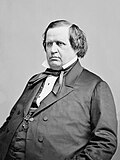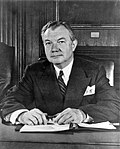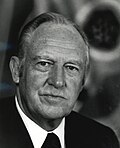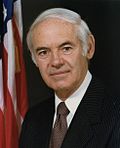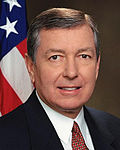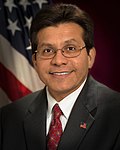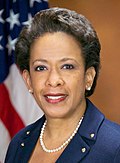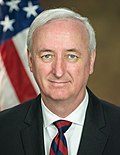Top Qs
Timeline
Chat
Perspective
United States Attorney General
Head of the US Department of Justice From Wikipedia, the free encyclopedia
Remove ads
The United States attorney general is the head of the United States Department of Justice and serves as the chief law enforcement officer of the federal government. The attorney general acts as the principal legal advisor to the president of the United States on all legal matters. The attorney general is also a statutory member of the Cabinet of the United States and a member of the United States National Security Council. Additionally, the attorney general is seventh in the presidential line of succession.
Remove ads
Under the Appointments Clause of the United States Constitution, the officeholder is nominated by the president of the United States, and, following a confirmation hearing before the Senate Judiciary Committee, will take office if confirmed by the majority of the full United States Senate. The attorney general is supported by the Office of the Attorney General, which includes executive staff and several deputy attorneys general.
The attorney general is a Level I position in the Executive Schedule and thus earns the salary prescribed for that level: $250,600, as of January 2025.
Remove ads
Name
The title Attorney General is an example of a noun (attorney) followed by a postpositive adjective (general).[3] "General" is a description of the type of attorney, not a title or rank in itself (as it would be in the military).[3] Even though the attorney general (and the similarly titled solicitor general) is occasionally referred to as "General" or "General [last name]" by senior government officials, this is considered incorrect in standard American English usage.[3][4] For the same reason, the correct American English plural form is "attorneys general" rather than "attorney generals".[4]
Remove ads
History

Congress passed the Judiciary Act of 1789 which, among other things, established the Office of the Attorney General. The original duties of this officer were "to prosecute and conduct all suits in the Supreme Court in which the United States shall be concerned, and to give his advice and opinion upon questions of law when required by the president of the United States, or when requested by the heads of any of the departments".[5] Some of these duties have since been transferred to the United States solicitor general and the White House counsel.
The Department of Justice was established in 1870 to support the attorneys general in the discharge of their responsibilities.
The secretary of state, the secretary of the treasury, the secretary of defense, and the attorney general are regarded as the four most important Cabinet officials in the United States because of the size and importance of their respective departments.[6]
The attorney general is a Level I position in the Executive Schedule,[2] thus earning a salary of US$221,400, as of January 2021.[7]
Remove ads
Duties and responsibilities
Summarize
Perspective
The attorney general's duties and responsibilities as the chief law enforcement officer of the federal government include overseeing the United States Department of Justice, enforcing federal laws, and providing both formal and informal legal advice and opinions to the president of the United States, the cabinet, and the heads of executive departments and agencies. The attorney general represents the federal government in legal matters and supervises the administration and operation of the Department of Justice, which includes the Federal Bureau of Investigation, the Drug Enforcement Administration, the Bureau of Alcohol, Tobacco, Firearms and Explosives, the Office of Justice Programs, U.S. Attorneys, and the United States Marshals Service.[8]
Additionally, the attorney general advises the president of the United States on appointments to federal judicial positions and Department of Justice roles, including U.S. Attorneys and U.S. Marshals. While the attorney general may represent the United States in the Supreme Court and other courts, this is typically handled by the solicitor general.[9][10] The attorney general also performs or supervises other duties as required by statute or executive order.
The attorney general manages legal issues involving public safety, civil rights, and national security. The attorney general also communicates legal concerns to Congress and ensures compliance with federal laws across states. The attorney general's role occasionally evolves through congressional legislation. For example, in 2001, the PATRIOT Act expanded the department's surveillance and investigative authority in matters of terrorism and national security, significantly impacting the scope of the attorney general’s responsibilities.[11] Additional duties include supervising federal penitentiaries and administering the United States Federal Witness Protection Program.
Presidential transition
It is the practice for the attorney general, along with the other Cabinet secretaries and high-level political appointees of the president, to tender a resignation with effect on the Inauguration Day (January 20) of a new president. The deputy attorney general is also expected to tender a resignation, but is commonly requested to stay on and act as the attorney general pending the confirmation by the Senate of the new attorney general.
For example, upon the inauguration of President Donald Trump on January 20, 2017, then-Attorney General Loretta Lynch left her position, so then-Deputy Attorney General Sally Yates, who had also tendered her resignation, was asked to stay on to serve as the acting attorney general until the confirmation of the new attorney general Jeff Sessions, who had been nominated for the office in November 2016 by then-President-elect Donald Trump.[12][a]
Remove ads
List of attorneys general
Parties
Federalist (4) Democratic-Republican (5) Democratic (34) Whig (4) Republican (41)
Status
Remove ads
Line of succession
Summarize
Perspective
28 U.S.C. § 508 establishes the first two positions in the line of succession, while allowing the attorney general to designate other high-ranking officers of the Department of Justice as subsequent successors.[30] Furthermore, an Executive Order defines subsequent positions, the most recent from March 31, 2017, signed by President Donald Trump.[31] The current line of succession is:
- United States Deputy Attorney General
- United States Associate Attorney General
- Other officers potentially designated by the attorney general (in no particular order):
- Solicitor General of the United States
- Assistant Attorney General, Antitrust Division
- Assistant Attorney General, Civil Division
- Assistant Attorney General, Civil Rights Division
- Assistant Attorney General, Criminal Division
- Assistant Attorney General, National Security Division
- Assistant Attorney General, Environment and Natural Resources Division
- Assistant Attorney General, Justice Management Division
- Assistant Attorney General, Tax Division
- Assistant Attorney General, Office of Justice Programs
- Assistant Attorney General, Office of Legal Counsel
- Assistant Attorney General, Office of Legal Policy
- Assistant Attorney General, Office of Legislative Affairs
- United States Attorney for the Eastern District of Virginia
- United States Attorney for the Eastern District of North Carolina
- United States Attorney for the Northern District of Texas
Remove ads
Notable figures
- First Italian American male: Charles Joseph Bonaparte in 1906[32]
- First Jewish American male: Edward H. Levi in 1975[33]
- First female: Janet Reno in 1993[34]
- First Hispanic American male: Alberto Gonzales in 2005[35]
- First African American male: Eric Holder in 2009[36]
- First African American female: Loretta Lynch in 2015[37]
See also
- Executive Order 13787 for "Providing an Order of Succession Within the Department of Justice"
Notes
- Unusually for a transitional acting appointment, Yates was dismissed and replaced with another Acting Attorney General before Sessions was confirmed because she refused to defend an executive order of the incoming administration.[13]
- Served as acting attorney general in his capacity as deputy attorney general, until his own appointment and confirmation as attorney general.
- On October 20, 1973, Solicitor General Robert Bork became acting attorney general following the "Saturday Night Massacre", in which U.S. Attorney General Elliot Richardson and Deputy Attorney General William Ruckelshaus both resigned.
- Served as acting attorney general in his capacity as deputy attorney general, until the appointment of a new attorney general. Thornburgh later served as attorney general from 1988–1991.
- Served as acting attorney general in his capacity as Assistant Attorney General for the DOJ Civil Division.[15] Gerson was fourth in the line of succession at the Justice Department, but other senior DOJ officials had already resigned.[16] Janet Reno, President Clinton's nominee for attorney general, was confirmed on March 12,[17] and he resigned the same day.[17]
- Served as acting attorney general in his capacity as deputy attorney general, until the appointment of a new attorney general. Holder later served as attorney general from 2009–2015.
- On August 27, 2007, President Bush named Solicitor General Paul Clement as the future acting attorney general, to take office upon the resignation of Alberto Gonzales, effective September 17, 2007.[18] On September 17, President Bush announced that Assistant Attorney General for the DOJ Civil Division Peter Keisler would become acting attorney general, pending a permanent appointment of a presidential nominee.[19][20] According to administration officials, Clement became acting attorney general at 12:01 am September 17, 2007, and left office 24 hours later.[21] Keisler served as acting attorney general until the confirmation of Michael Mukasey on November 9, 2007.
- Served as acting attorney general in her capacity as deputy attorney general, until she was fired after saying the Department of Justice would not defend an executive order in court.[22]
- Following the resignation of Jeff Sessions as attorney general at the request of President Donald Trump, Rosenstein served as acting attorney general in his capacity as deputy attorney general for a few hours on November 7, 2018 until Trump signed an executive order naming Matthew Whitaker as acting attorney general later that day.[23]
- The legality of Matthew Whitaker's appointment as acting attorney general was called into question by several constitutional scholars. Among those included Neal Katyal and George T. Conway III, who asserted it is unconstitutional, because the Attorney General is a principal officer under the Appointments Clause, and thus requires senate consent, even in an acting capacity.[24] Maryland filed an injunction against Whitaker's appointment on this basis.[25] John E. Bies at Lawfare regarded it as an unresolved question.[26] The DOJ Office of Legal Counsel released a legal opinion, asserting that the appointment was legal and consistent with past precedent.[27]
- Served as acting attorney general in his capacity as Assistant Attorney General for the DOJ National Security Division for a few hours following the resignation of Jeffrey Rosen at noon on January 20, 2021. President Joe Biden signed an executive order naming Deputy Assistant Attorney General for Human Resources and Administration Monty Wilkinson as acting attorney general later that day.[28]
Remove ads
References
External links
Wikiwand - on
Seamless Wikipedia browsing. On steroids.
Remove ads






















